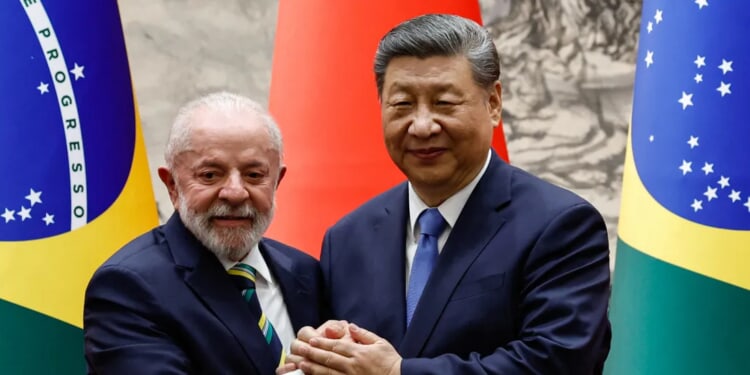At the United Nation’s General Assembly, Brazilian President Luiz Inácio Lula da Silva gave a speech decrying attacks on his country’s “sovereignty.” Though Lula was not-so-subtly calling out the Trump administration’s 301 investigation into his country for unfair trade practices, the Brazilian president misidentified the true threat to his nation’s sovereignty. By making deals with China while castigating the U.S. and American companies, Lula is ignoring not only the long-term threats posed by the communist regime, but also the benefits of embracing and building on the relationship with American technology companies that power many of the country’s startups and unicorns.
The truth is, Brazil is waging a two-front war on American tech. It is driving U.S. companies out with discriminatory censorship threats and punitive data laws, then handing the market over to Chinese firms with direct links to the Chinese Communist Party (CCP).
This is not only unfair to U.S. companies seeking to compete on a level playing field – it also poses a growing national security threat to the United States. China’s inroads in Brazil and the Western Hemisphere should be raising alarm bells in Washington. The largest economy in South America, and a longtime U.S. partner, is now linking arms with a regime that seeks to displace the United States as the world’s preeminent power. Though Trump revealed in a Truth Social post that the two presidents spoke recently about the economy and trade, a more in-depth conversation about a path forward will dominate the forthcoming Trump-Lula meeting both have said is imminent.
When the Trump administration opened a Section 301 investigation into Brazil’s digital trade practices in July, Ambassador Jamieson Greer specifically highlighted attacks on American technology innovators. The investigation is a result of years of predatory policies that are pushing American firms out of the market. (RELATED: Trump Warns Beijing Of ‘Countermeasures’ As China Tightens Grip On Critical Resources)
And, as U.S. companies are pushed out, China has moved quickly to fill the void.
At the heart of this shift lies Huawei – a Chinese telecom giant with concerning ties to the Chinese government. Huawei is celebrating 25 years in Brazil and is now indisputably the country’s leading digital contractor. It controls nearly 45 percent of Brazil’s 5G networks, supports much of its legacy 3G and 4G architecture, and built the fiber optic network linking more than 20 cities across the Amazon rainforest. The CCP-linked company describes itself as playing a “central role,” in Brazil’s digital infrastructure – and the evidence supports the claim.
Huawei’s reach goes far beyond mobile networks. As of 2024, it operates three major data center clusters in Brazil and is preparing to launch a fourth. One of its next partnerships is expected to involve Dataprev, a Brazilian state-run firm that manages Brazil’s social data systems. That deal would give a Chinese state-linked company access to infrastructure that includes social security information for tens of millions of citizens and government cloud services used by many federal agencies, including those that handle sensitive information. Huawei and Dataprev have already signed a cooperation agreement to build an AI center linked to Brazil’s public universities.
ByteDance, the Chinese parent company of TikTok, is not far behind. It plans to invest up to $8.7 billion in a new data center on Brazil’s northeast coast. This expansion would put a Chinese-controlled platform with a record of aggressive data harvesting at the center of Brazil’s digital infrastructure.
Brazil’s decision to outsource its digital infrastructure to companies that answer to the CCP, while penalizing American firms, gives enormous leverage to America’s chief adversary. When Chinese firms control a country’s communications systems, cloud networks, and AI infrastructure, the U.S. loses strategic visibility and influence.
This realignment is neither subtle nor isolated. Since taking office in 2023, President Lula has met with Xi Jinping three times. In one meeting alone, the two countries signed over 40 cooperation agreements spanning farming, solar power, communications, and nuclear energy. China now refers to Brazil as a “golden partner.” Lula has called the relationship “indestructible.”
Beijing is matching that rhetoric with investment. In 2025, China announced more than $4.5 billion in new projects across Brazil. Where American firms once competed, they now face regulatory exclusion or subsidized Chinese replacement. (RELATED: China Throws A Fit After US Identifies Key Weakness In Trade Talks)
“China’s arrival is excellent,” Brazil’s secretary of industrial development said in 2025. Another minister praised China for delivering “reciprocal achievements” – a pointed contrast, he noted, to the “trade instability” with the United States. That assessment is short sighted at best. China’s history of debt diplomacy makes clear that, while their deals appear attractive at the outset, there are always strings attached. Once a relationship of dependence is established, the communist regime never hesitates to use this leverage to ensure political obedience from junior partners.
The Trump administration’s Section 301 investigation is a critical step in confronting Brazil’s treatment of American companies, but it is much more than a simple trade dispute.
Brazil is not just engaged in regulatory overreach against the United States. It is repositioning itself in the geopolitical landscape, and Beijing is the beneficiary. The deepening Brazil-China relationship is but the tip of the iceberg of China’s plans in the Western Hemisphere.
This is not business as usual, and it’s time to stop pretending that it is.
John Czwartacki is co-founder and principal at Public Policy Solutions.

















